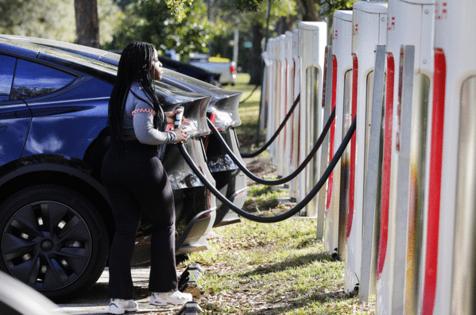Outrage over Trump's electric vehicle policies is misplaced
Published in Political News
Electric car subsidies are heading for the chopping block. A tax bill recently passed by House Republicans is set to stop billions in taxpayer cash from being spent on electric vehicle purchases.
If embraced by the Senate and signed into law by President Donald Trump, the bill would gut long-standing government handouts for going electric.
The move comes on the heels of another climate policy embraced by Republicans. Earlier this year, Trump announced plans to roll back burdensome rules that effectively force American consumers to buy electric, rather than gas-fueled, cars. The Environmental Protection Agency has called that move the “biggest deregulatory action in U.S. history.”
Not everyone sees it that way. Jason Rylander, legal director at the Center for Biological Diversity’s Climate Law Institute, assailed Trump’s efforts, noting that his “administration’s ignorance is trumped only by its malice toward the planet.”
Other similarly aligned groups have voiced similar sentiments arguing that ending these rules would “cost consumers more, because clean energy and cleaner cars are cheaper than sticking with the fossil fuels status quo.”
Backtracking on EV purchasing mandates seems to have hit Trump haters particularly hard. That mandate — established by President Joe Biden — would have pushed U.S. automakers to sell more EVs. Millions more. Electric cars currently account for 8% of new auto sales. Biden ordered— by presidential fiat — that figure to climb to 35% by 2032. If you believe the hype, the result would be an electric nirvana, one defined by cleaner air and rampant job creation.
I’m not convinced. For one thing, cleaner air courtesy of electrification requires that EVs replace gas-powered autos. They’re not. In fact, study after study suggests that the purchase of EVs adds to the number of cars in a household.
And two-thirds of households with an EV have another non-EV that is driven more — hardly a recipe for climate success given that EVs must be driven (a lot) to deliver climate benefits. Fewer miles driven in an EV also challenges the economic efficiency of the billions Washington spends annually to subsidize their purchase.
Claims of job creation thanks to EVs are even more questionable. These claims are predicated around notions of aggressive consumer demand that drives increased EV manufacturing. This in turn creates jobs.
A recent Princeton University study noted, “Announced manufacturing capacity additions and expansions would nearly double U.S. capacity to produce electric vehicles by 2030 and are well sized to meet expected demand for made-in-USA vehicles.”
Jobs would be created if there were demand for EVs. Except that’s not what’s happening. Rather, consumer interest in EVs has effectively cratered. In 2024, 1.3 million EVs were sold in the United States, up from 1.2 million in 2023. This paltry increase is even more worrying given drastic price cuts seen in the EV market in 2024. Tesla knocked thousands of dollars off its best-selling Model 3 and Model Y. Ford followed suit by cutting prices on its Mach-e. So did Volkswagen and Hyundai.
Despite deep discounts, consumer interest in electrification remains — to put it mildly — tepid at best. So, when people equate electrification with robust job creation, I’m left wondering what they are going on about.
Even if jobs were created, EV advocates are coy about how many of those jobs would benefit existing autoworkers. Would all these workers — currently spread across large swaths of the Midwest — be guaranteed jobs on an EV assembly line? If not, how many workers should expect to receive pink slips? For those who do, will they be able to find new jobs that pay as much as their old ones? Touting job creation for political expediency is one thing. Fully recognizing its impact on hardworking American families today, another.
Some Americans may decry Trump’s actions on climate, but they have only themselves to blame. Many of the pro-climate policies enacted, particularly during the Biden era, deliver little in the way of climate benefits (or any benefit for that matter) while making a mockery of the real economic concerns businesses and consumers have about climate action.
No more. In justifying climate rollbacks, the president says many of his predecessor’s policies have hurt rather than helped the American people. He’s right and should be commended for doing something about it.
____
Ashley Nunes is a senior research associate at Harvard Law School.
___
©2025 Chicago Tribune. Visit at chicagotribune.com. Distributed by Tribune Content Agency, LLC.

























































Comments